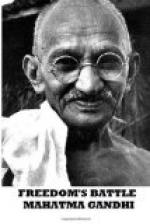The first shock came in the shape of the Rowlalt Act a law designed to rob the people of all real freedom. I felt called upon to lead an intensive agitation against it. Then followed the Punjab horrors beginning with the massacre at Jallianwala Bagh and culminating in brawling orders, public floggings and other indescribable humiliations, I discovered too that the plighted word of the Prime Minister to the Mussalmans of India regarding the integrity of Turkey and the holy places of Islam was not likely to be fulfilled. But in spite of the foreboding and the grave warnings of friends, at the Amritsar Congress in 1919 I fought for co-operation and working the Montagu-Chelmsford reforms, hoping that the Prime Minister would redeem his promise to the Indian Mussalmans, that the Punjab wound would be healed and that the reforms inadequate and unsatisfactory though they were, marked a new era of hope in the life of India. But all that hope was shattered. The Khilafat promise was not to be redeemed. The Punjab crime was white-washed and most culprits went not only unpunished but remained in service and some continued to draw pensions from the Indian revenue, and in some cases were even rewarded. I saw too that not only did the reforms not mark a change of heart, but they were only a method of further draining India of her wealth and of prolonging her servitude.
I came reluctantly to the conclusion that the British connection had made India more helpless than she ever was before, politically and economically. A disarmed India has no power of resistance against any aggressor if she wanted to engage in an armed conflict with him. So much is this the case that some of our best men consider that India must take generations before she can achieve the Dominion status. She has become so poor that she has little power of resisting famines. Before the British advent India spun and wove in her millions of cottages just the supplement she needed for adding to her meagre agricultural resources. The cottage industry, so vital for India’s existence, has been ruined by incredibly heartless and inhuman processes as described by English witnesses. Little do town-dwellers know how the semi-starved masses




